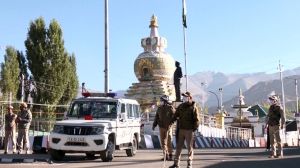A little less taxing for middle class
Fulfilling his promise to the middle classes his predecessor’s budget had alienated, Finance Minister Jaswant Singh today announced som...

Fulfilling his promise to the middle classes his predecessor’s budget had alienated, Finance Minister Jaswant Singh today announced some minor tax concessions in the Lok Sabha.
Topping the list is the increase in tax exemptions under Section 80L, from the existing Rs 12,000 to Rs 15,000 now — 80L covers income from NSCs, bank interest and other such income including Rs 3,000 of interest income on specified government paper.
TDS deduction on dividend income has been hiked from Rs 1,000 proposed by Yashwant Sinha in his budget, to Rs 2,500 now. LIC premia will remain unchanged, as Jaswant Singh has done away with Sinha’s proposal to levy a 5 percent service tax on the risk-portion of insurance premia. A new 7-percent 6-year tax relief bond is also to be introduced.
No changes, however, have been made in the 3 percent tax surcharge imposed by Sinha. Nor has Singh made any changes in the Sinha-proposal to virtually halve the benefits under Section 88 (this includes LIC premia, investments in provident funds and so on).
Singh also announced his intent to allow Indian Depository Receipts, a new form of security which will allow Indians to buy a stake in overseas companies as well as NRI ventures.
While the details are yet to be worked out, theoretically this means Indian investors will be able to buy a stake in, say, General Motors, or even Sabeer Bhatia’s Hotmail (if he still owned it).
Other announcements by Singh include setting up of a Serious Frauds Office within the Department of Company Affairs. SEBI is to move towards an even shorter settlement cycle (T+1) to clean up the stock markets further.
And, apart from the Rs 500 crore that is to be provided to UTI (this was announced yesterday), the government has extended a guarantee of Rs 1,000 crore to UTI — this will enable UTI to borrow this money to repay its MIP investors.
Unveiling his reform agenda, Singh told the Lok Sabha that he would soon set up three task forces to simplify procedure and streamline the cumbersome Income Tax Act and indirect tax laws. The task forces on IT Act and indirect tax laws will submit their reports within 90 days to enable the government to incorporate the reforms in the next budget.
The third task force, Singh announced, was meant to look into ways to reduce paperwork and would be asked to submit its recommendations within 45 days.
Welcoming Singh’s sops, income tax consultant Subhash Lakhotia clarified that of the Rs 15,000 of Section 80L benefits, an amount of Rs 3,000 pertains to the interest income from government securities, but very few middle-class investors buy such paper. PNB Gilts, Lakhotia said, is the only place where such government securities can be bought.
Jaswant Singh also said he would remove the secrecy surrounding the pruning of the Customs rates. These would be trimmed to two slabs of ten and 20 per cent by 2004-05 by holding discussions with trade and industry. He added that he would take steps, in consultation with the commerce and industry ministry, to prevent the misuse of export subsidies.



- 01
- 02
- 03
- 04
- 05




























